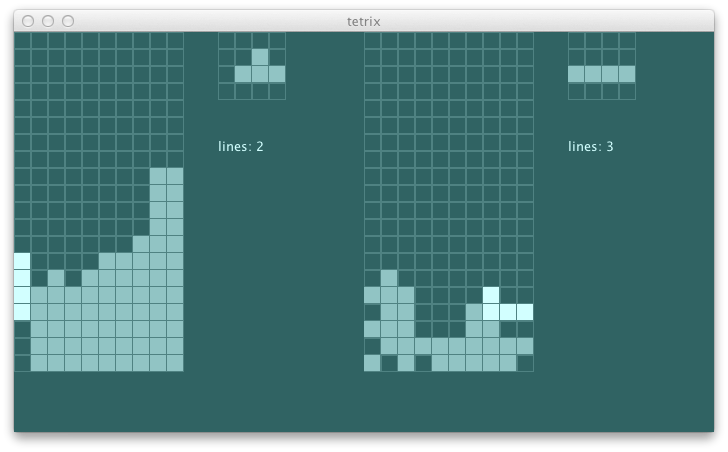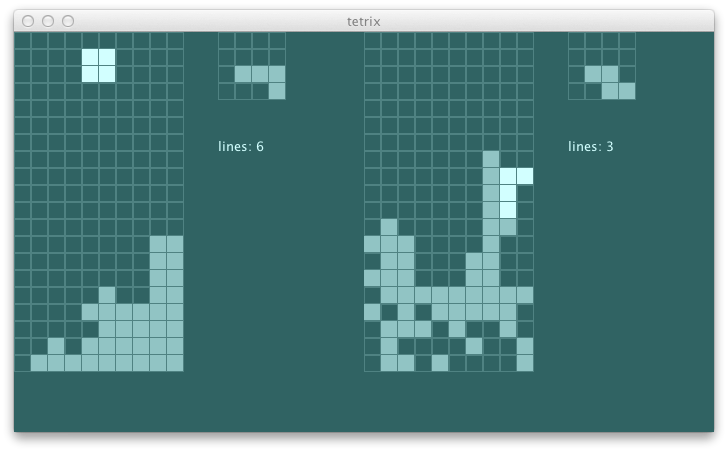attacks
Currently two players are just playing side by side. Let’s introduce attacks. Whenever a player deletes two or more lines in an action, some of the blocks should show up at the bottom of the opponent’s grid on the next spawn cycle.
Let’s spec the stage first:
s2"""
Attacks should
increment the pending attack count, $attack1
and change the blocks in the view on spawn. $attack2
"""
...
def attack1 =
notifyAttack(s1).pendingAttacks must_== 1
def attack2 =
Function.chain(notifyAttack :: drop :: Nil)(s1).blocks map {_.pos} must contain(
(0, 1), (4, 1), (5, 1), (6, 1), (5, 2),
(4, 18), (5, 18), (6, 18), (5, 19)
)
Stub it out:
val notifyAttack: GameState => GameState = (s0: GameState) => s0
The test fails as expected:
[info] Attacks should
[error] x increment the pending attack count,
[error] '0' is not equal to '1' (StageSpec.scala:35)
[error] x and change the blocks in the view on a tick.
[error] '(0,0), (4,17), (5,17), (6,17), (5,18)' doesn't contain in order
'(1,0), (4,17), (5,17), (6,17), (5,18)' (StageSpec.scala:36)
Here’s the first part:
val notifyAttack: GameState => GameState = (s0: GameState) =>
s0.copy(pendingAttacks = s0.pendingAttacks + 1)
The second attack function looks similar to clearFullRow:
val attackRandom = new util.Random(0L)
private[this] lazy val attack: GameState => GameState =
(s0: GameState) => {
def attackRow(s: GameState): Seq[Block] =
(0 to s.gridSize._1 - 1).toSeq flatMap { x =>
if (attackRandom.nextBoolean) Some(Block((x, 0), TKind))
else None
}
@tailrec def tryAttack(s: GameState): GameState =
if (s.pendingAttacks < 1) s
else tryAttack(s.copy(
blocks = (s.blocks map { b => b.copy(pos = (b.pos._1, b.pos._2 + 1)) } filter {
_.pos._2 < s.gridSize._2 }) ++ attackRow(s),
pendingAttacks = s.pendingAttacks - 1
))
tryAttack(s0)
}
This is added to ticking process as follows:
val tick = transit(_.moveBy(0.0, -1.0),
Function.chain(clearFullRow :: attack :: spawn :: Nil) )
All tests pass:
[info] Attacks should
[info] + increment the pending attack count,
[info] + and change the blocks in the view on spawn.
Next, we’ll use StageActors to notify each other’s attacks. We can let the stage report the number of lines deleted in the last tick as lastDeleted:
case class GameState(blocks: Seq[Block], gridSize: (Int, Int),
currentPiece: Piece, nextPiece: Piece, kinds: Seq[PieceKind],
status: GameStatus = ActiveStatus,
lineCount: Int = 0, lastDeleted: Int = 0,
pendingAttacks: Int = 0) {...}
Add a new message type Attack and implement notificaton in StageActor:
case object Attack extends StageMessage
class StageActor(stateActor: ActorRef) extends Actor {
import Stage._
def receive = {
case MoveLeft => updateState {moveLeft}
case MoveRight => updateState {moveRight}
case RotateCW => updateState {rotateCW}
case Tick => updateState {tick}
case Drop => updateState {drop}
case Attack => updateState {notifyAttack}
}
private[this] def opponent: ActorRef =
if (self.path.name == "stageActor1") context.actorFor("/stageActor2")
else context.actorFor("/stageActor1")
private[this] def updateState(trans: GameState => GameState) {
val future = (stateActor ? GetState)(1 second).mapTo[GameState]
val s1 = Await.result(future, 1 second)
val s2 = trans(s1)
stateActor ! SetState(s2)
(0 to s2.lastDeleted - 2) foreach { i =>
opponent ! Attack
}
}
}
This creates attacks when 2 or more lines are deleted. Here’s an example:

The I bar is going to eliminate bottom 4 rows, creating 3 attacks.

We’ll pick it up from here tomorrow.
$ git fetch origin
$ git co day11v2 -b try/day11
$ sbt swing/run